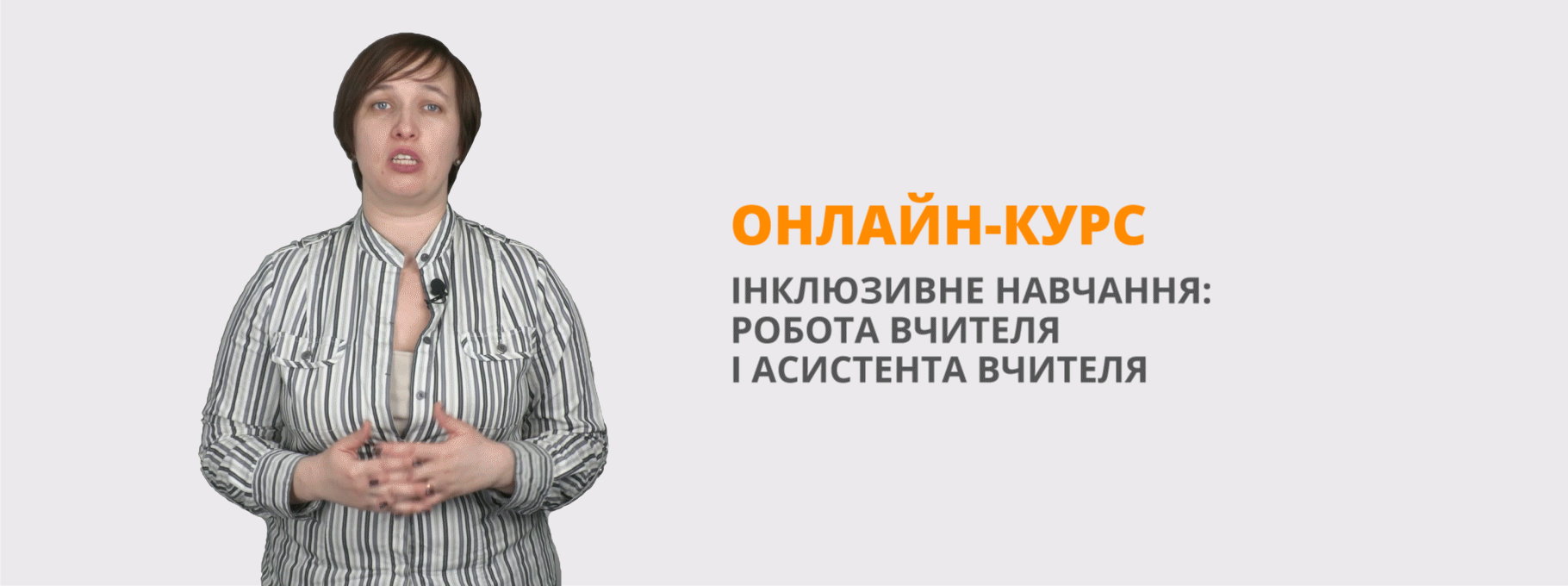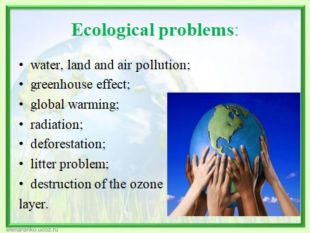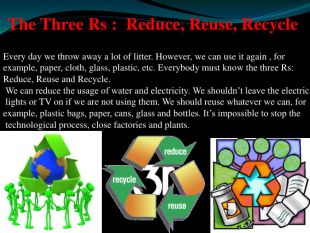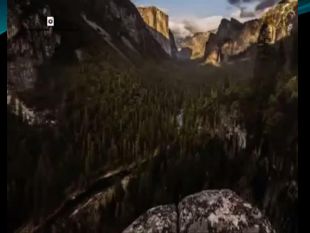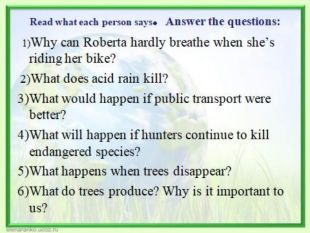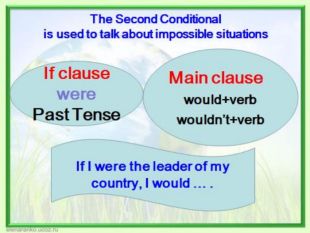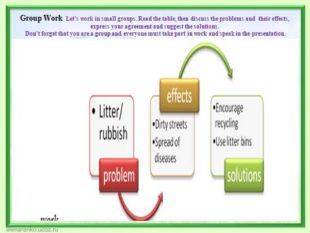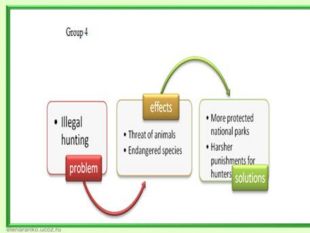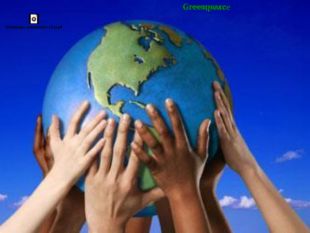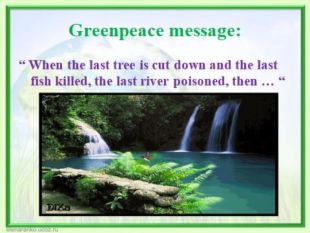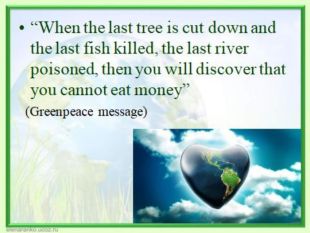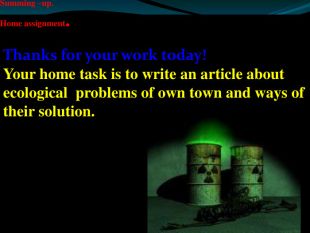Розробка уроку з презентацією з англійської мови на тему "Nature in danger"
- Lesson.docx docx
- Presentation.pptx pptx
Урок англ.мови з теми: « Is the Earth in danger? » в 10 кл.
Вчитель: Гапон Т. А. ліцей №9, м. Прилуки
Procedure
I. Introduction
- Greeting
Good afternoon, boys and girls!
I hope you are ready to work hard. Be calm and confident on your way to get knowledge.
- Lead-in
- We continue to study the topic “Environmental problems” and the subject matter of today’s lesson is “Is the Earth in danger».
- T: I suggest you a part of the Greenpeace message for today’s discussion:
“When the last tree is cut down and the last fish killed, the last river poisoned, then…” (Greenpeace message)
Let’s discuss some ecological problems and define the ending of this quotation.
T: By the end of the lesson you’ll be able to express your feelings about the environment, to give your arguments, to respond logically to your friends’ opinions.
- Warming – up
T: I hope you will agree with me that nowadays everybody wants to live in a safe and healthy world.
We are given the world that is …
P1: Beautiful.
P2: Wonderful.
P3: Unique.
P4: Rich and very fragile
P5: Magic and unusual.
T: What makes our world beautiful?
P1: Blue oceans and seas, lakes and rivers.
P2: Green forests and parks, beautiful gardens and squares.
T: Nowadays people understand how important it is to solve the environment problems. Let's start with revising our topical vocabulary.
T: What are the major problems facing humanity in the 21st century?
- water, land and air pollution;
- greenhouse effect;
- global warming;
- radiation;
- deforestation;
- litter problem;
- destruction of the ozone layer:
- natural disasters:
- overpopulation.
II. Main part
1.Check-in homework
Project work
T: So , what are the main ecological disasters and problems we are having now?
Pupils presentations. ( Additional material ).
Air Pollution
Until about 150 years ago, the air was clean and pure – perfect for the people and animals to breathe. Then people started building factories. Those factories and many of the things they make, put a lot of harmful gases into the air. People are driving cars, which add more pollution into the air. They emit dust, dioxide and other harmful substances into the atmosphere. I can’ but mention that a man pollutes air especially in such cities as Chicago, Detroit, Tokyo, Sheffield, as well as Kyiv, Kharkiv, Donetsk, Dnipro and many other places in Ukraine and abroad. The cities have air filled with a pollution called “smog”. This is so strong in some places that the air which should be blue, actually looks brown .One third of the emissions into the atmosphere originate from automobile transport so as a result it is become very difficult to breathe in large cities. Polluted air is not only bad for people and animals, but for trees and other plants as well. And in some places it is even damaging farmers’ crops – the food we eat. What’s more , man cuts down trees that produce oxygen that is so necessary for people to live. So it’s very important for us to clean up the air we all breathe.
T: It is a very serious accusation, but you are right.
Water pollution
The planet Earth is mostly water. Oceans cover the biggest part of it- there are lakes, rivers, streams and even water underground. All life on Earth –from the littlest bug to the biggest whale –depends on this water. It is precious. But we are not doing a good job of keeping water clean. In many places , the water has become polluted. The Pacific Ocean has suffered from nuclear pollution. Rivers and lakes are polluted by garbage or by poisonous chemicals which are dumped right into them. Underground water can be polluted by gasoline or other harmful liquids that seep into the ground. Some fertilizers and pesticides used on farms leak down through the dirt, too. The ocean which is a home to so much life, has been used as a place to dump garbage and poisonous chemicals. It is getting polluted , too. People forget the words of a famous scientists Thur Heyrdahl who said , “ If the ocean dies, the man will die too.” We need to save our water , to keep it clean and healthy so people , plants and animals will always have come to drink. And so fish and other creatures will have a place to live.
Soil Pollution
Another reason is the pollution of soil. I want to emphasize that man pollutes land with rubbish, dust, pesticides and other harmful substances. Coal- using industries such as metallurgical, coke-chemical plants, steel mills as well as thermal power plants emit uncontrolled amount of dioxide, dust and unburned hydrocarbons. As a result of this contamination many species have disappeared. Bear is mind that food can’t be produced on the polluted soil. Many parts of the world are overcrowded; people live in big cities and produce a lot of waste. Waste from factories and power stations is especially dangerous and not only for the environment ,wildlife but also for people. It is necessary to say about the disappearing of rainforests. Today in South America 50 hectares of forests disappear every minute. It happens because people need wood and paper , minerals, more room for farming and housing. In Africa, the desert is growing larger and larger. The soil is becoming poorer and poorer.
The Greenhouse Effect
A greenhouse is a building made of glass where you can grow flowers and other plants that need a lot of warmth. The sun shines in through the glass and warms the greenhouse, and the roof and walls keep the heat from getting out. The Earth is surrounded by a blanket of gasses. The gas named carbon dioxide acts just like a greenhouse. The sun shines in and the blanket of gases traps the heat like a roof, keeping it close to the planet. That’s good. We cannot live without warmth. Factories, electric power plants and cars are making a lot of gases. Even trees, when they are cut down give off gases. These new gases are trapping more and more of the sun’s heat. This is called greenhouse effect or global warming. If the Earth’s temperature gets hotter by just a few degrees it could change the weather all over the world in big ways. Places that are warm would become too hot to live in, and places that are cold would become warm. The places that grow our food would get too hot to do it.
The Ozone Hole
Up in the sky, above the air we breathe, there is a layer of gas called ozone. It helps us by blocking out rays from the sun that can harm our skin, and by letting the rays that are good for us come though. We are lucky to have the ozone layer to protect us. Now the ozone layer is being damaged by gases that people have made. The gases are called CFCs –chloro –fluoro-carbons.They are used in refrigerators, air-conditioners, plastic foam and some other things. The CFCs float up to the top of the atmosphere where the layer of ozone is and “eat up” the ozone. Scientists are concerned about the ozone layer, because a lot of it has gone away in just a few years. So it is important that we learn to do something about it.
Acid Rain
When we look up, we see clouds and the blue sky. But there are other things in the sky that we don’t see. Some of these are harmful to the Earth. When power plants burn coal to make electricity, and when cars burn gasoline, invisible gases are released into the air. Some of these gases can mix with rain or snow and make it acidic, like lemon juice or vinegar. Sometimes the gases get into rain clouds, where they get mixed in with rain or snow. Then the acid falls back to earth with rain or snow. This is called acid rain. Acid rain is extremely harmful to plants, rivers and lakes, and the creatures that live in them. In some places it is killing forests. And it pollutes the water that animals and people need to drink. It’s very important for us to stop making acid rain. One good way is to drive our cars less. Another good way is to save energy. The less energy we use, the less fuel those power plants have to burn. Industrial countries should control their level of pollution. This is already happening in some parts of Europe. There are several countries have cut their acid rain pollution by 30%.
Urban Problems
The urban problem is one of the most complex in today’s world. One of every six people lives in a city with a population of more than one million. There is a tendency towards rise in the population of cities. Today there are a lot of big cities in the world with the population ranging from 5 to 10 million and above. By the year 2015 demographers expect that Mexico City will have a population of 53 mln, Calcutta, some 25 mln and Bombay and Jacarta, from 20 to 25 mln.There more than 20 cities in the CIS states with the population of over 1mln. The problem arising as a result of this are water supply, public transport, unemployment, food, housing construction, air pollution, noise, etc. The problem of ecological imbalance in big cities are very urgent and they can call a crisis if due measures are not taxen.
Too Much Garbage
When we throw something away it goes in a garbage can. Once a week a garbage truck comes and the can is emptied, and that’s the last you see of it. But what do you think happens to the garbage then? Does it just disappear? No way!
Almost all garbage is taken to a garbage dump or land fill, where the garbage truck empties it onto the ground. After the truck leaves, a big tractor comes along and pushes dirt on top of the garbage. So, most of our garbage is just buried. Now we are making so much garbage that in many places there is not enough room to bury it all. We have to act fast and cut down the amount of garbage we make. Can we do it? You bet! We can recycle ( re-use) materials instead of throwing them away, or recycle which means not buying things that we can’t use. This way we’ll produce a lot of less garbage and help keep our planet clean.
Disappearing Animals
Every day, there are more and more people living on Earth. All these people need room to live. So, they move into places that are already homes for plants and animals. Forests are cut down, and wild areas are filled with houses and stores. When people move into new land the plants and animals that live there can become endangered and begin to disappear. Some even become extinct – which means that they all die and go from the Earth forever. What can happen. We enjoy pictures and stories about the dinosaurs which lived on the Earth many years ago. They are extinct now. That could happen to elephants, zebras, red-wood trees, frogs, butterflies, robins or goldfish… or other animals if we’re not careful.
Statistics have just been released showing the number of endangered species on the ‘red list’, that is species on the brink of extinction. This list has grown dramatically in the last few years. Over a quarter of the word’s reptiles and the fifth if the word’s amphibians are all threatened by the destructions of their habitats. Eleven species of mammals are in danger and these include tigers, whose population is down to 5,000, and giant pandas, whose population is around 1,000 owing to deforestation. However, there is some good news. The white rhino, which in 1970 was on the verge of extinction with only 200 animals left, has now recovered, and there are now 11,000 white rhino in the world. Let’s keep the Earth green and healthy and full of millions of wonderful creatures.
The Three Rs : Reduce, Reuse, Recycle
Every day we throw away a lot of litter. However, we can use it again, for example, paper, cloth, glass, plastic, etc. Everybody must know the three Rs: Reduce, Reuse and Recycle. We can reduce the usage of water and electricity. We shouldn’t leave the electric lights or TV on if we are not using them. We should reuse whatever we can, for example, plastic bags, paper, cans, glass and bottles. It’s impossible to stop the technological process, close factories and plants. People need to invent new waste free technologies that will not do harm to nature. There are new inventions such as filters that make water and air clean. Some factories and plants have already started using these machines and this helps to prevent pollution. Special kinds of gasoline for cars can help to reduce air pollution. To protect our environment from toxic wastes we should use public transport if possible. We mustn’t ignore the problem of the environmental pollution and try to make everything possible to reduce if not to stop.
2.Listen to “The Earth Song “by Michael Jackson and be ready to answer the questions after the listening.
What is the main idea of this song?
- Grammar point
It’s high time to practice grammar. We can use the Second Conditional to talk about 'impossible' situations. Notice that after I / he/ she /it we often use 'were' and not 'was'. Make some sentences using our grammar “The Second Conditional”. This list includes possible solutions to the ecological problems, so read your sentences.
- use bicycles
- stop using aerosols
- plant new trees
- stop polluting the environment
- create special parks for animals
P: If we used bicycles, we would have less air pollution.
P: If people stopped using aerosols, it would help the environment.
P: If we planted new trees, rainforests wouldn’t disappear.
P: If people stopped polluting the environment, the world would be a safer place.
P: If we created special parks for animals, they wouldn’t be in danger.
- Reading and Speaking
Let’s practice our grammar in reading and speaking activities.
The aim of this part of the lesson is to teach you to find out and appreciate the information, analyze it and draw conclusions using your logical thinking.
1) Pre-reading activity:
Look at the screen. There are some little texts there. Skim the texts and answer the question “What ecological problems are children talking about?”
While-reading activity:
Read what each person says.
Post-reading activity:
Answer the questions:
- Why can Roberta hardly breathe when she’s riding her bike?
- What does acid rain kill?
- What would happen if public transport were better?
- What will happen if hunters continue to kill endangered species?
- What happens when trees disappear?
- What do trees produce? Why is it important to us?
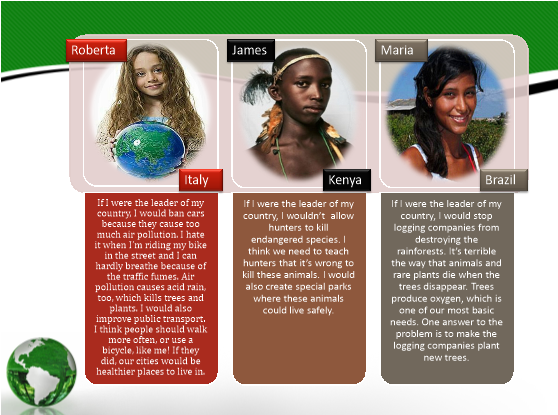
T: What would you do if you were the leader of your country?
P1: If I were the leader of my country, I would…
5) Group Work
T: Now let’s work in small groups.
Read the table, then discuss the problems and their effects, express your agreement and suggest the solutions. Don’t forget that you are a group and everyone must take part in work and speak in the presentation.
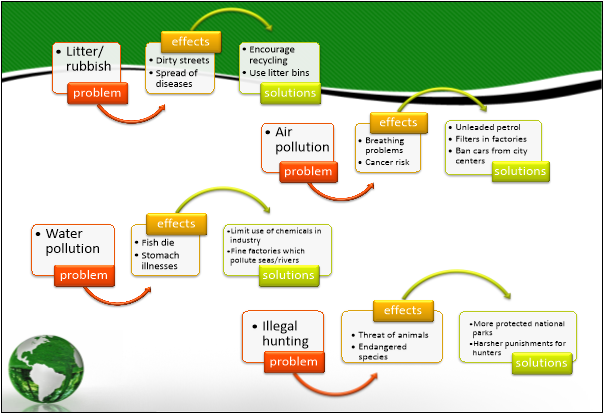
- Listening
T: Thank you for your work. It was excellent but I have one more task for you.
T: Have you ever heard about a global organization “Greenpeace”? What is its goal?
P: The goal of this organization is to protect our planet’s environment.
1) Pre-listening activity:
T: Let’s listen to the story about Greenpeace.
Look at the blackboard, there are some words and word-combinations. Pay attention:
- to bear witness – свідчити
- sea otters – морські видри
- а bald eagle – бiлоголовий орел
- а peregrine falcon – сокіл-сапсан
- to spark a flurry – викликати шквал(емоцій)
- a bird sanctuary – пташиний заповідник
- Amchitka – геогр. острів у берегів Аляски
Post-listening activity:
Listen and say what Greenpeace is. Answer my questions:
1. When and where did a small team of activists set sail?
2. What was the mission of these activists?
3. What was the result of their journey?
4. What can you say about Greenpeace today? (3answers)
5. What is the main goal of Greenpeace?
Listening
Greenpeace
In 1971, motivated by their vision of a green and peaceful world, a small team of activists set sail from Vancouver, Canada, in an old fishing boat. These activists, the founders of Greenpeace, believed a few individuals could make a difference.
Their mission was to «bear witness» to US underground nuclear testing at Amchitka, a tiny island off the West Coast of Alaska. Amchitka was the last refuge for 3000 endangered sea otters, and home to bald eagles, peregrine falcons and other wildlife.
The journey sparked a flurry of public interest. Nuclear testing on Amchitka ended the same year, and the island was later declared a bird sanctuary.
Today, Greenpeace is an international ecological organization that has 3 million supporters worldwide. Its headquarters are based in Amsterdam, the Netherlands.
Greenpeace unites people of different colours living in different continents and speaking different languages. The common mission of this organization is preserving life on the earth in its full variety.
Greenpeace does not support any political party. As a global organization, Greenpeace focuses on the most crucial worldwide threats to our planet's environment. It campaigns to stop climate change, save the oceans, stop whaling, say no to genetic engineering, stop the nuclear threat, and eliminate toxic chemicals. The mountaineers of Greenpeace hang the slogans “Stop acid rains”, “Pure rivers”, “Clean seas”, “Stop criminals”, “No fish, no future” on factories chimneys, on ships, on Big Ben, on the Statue of Liberty, on the Statue of Redeemer.
The goal of Greenpeace is to expose environmental criminals.
III. Summary
- Reflection
T: At the beginning of the lesson I have proposed you a part of the Greenpeace message:
“When the last tree is cut down and the last fish killed, the last river poisoned, then …” (Greenpeace message)
T: Please give your own ending of this quotation.
T: Look at the screen, there is a whole Greenpeace message there:
“When the last tree is cut down and the last fish killed, the last river poisoned, then you will see that you cannot eat money” (Greenpeace message)
T: Do you agree with it?
- Marks
- HW
What have you chosen from this lesson for yourself?
T: Thanks for your work today! Your home task is to write an article about ecological problems of own town and ways of their solution.
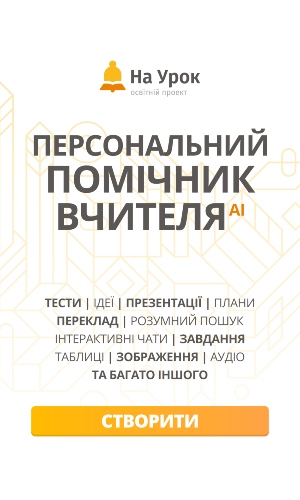

про публікацію авторської розробки
Додати розробку
